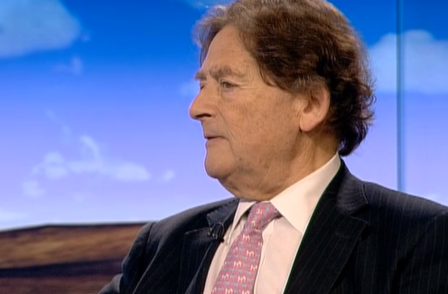
Former Chancellor of the Exchequer Lord Lawson believes he has been effectively banned from discussing climate change on the BBC again.
He has spoken out after the BBC’s Editorial Complaints Unit criticised the Today programme for airing a discussion in which Lawson argued with chairman of the Granthan Institute for Climate Change Sir Brian Hoskins about the causes of last winter’s UK flooding and storms.
In the interview Lawson, founder of the Global Warming Policy Foundation, questioned whether there has been climate warming in recent year and whether cutting carbon emissions in the UK was an appopriate response to a warming climate.
This led to a flood of complaints to the BBC from many arguing that minority views on global warming should not be given equal prominence to the majority who believe climate change is man-made.
According to the Daily Mail the head of the BBC Editorial Complaints Unit Fraser Steel said: “Minority opinions and sceptical views should not be treated as if it were on an equal footing with the scientific consensus.
“Lord Lawson's views are not supported by the evidence from computer modelling and scientific research and I don't believe this was made sufficiently clear to the audience.”
Lawson said that complainant, Green party politician Chit Chong, was told by Fraser that he would not be allowed to appear on the Today programme again.
However the letter from Fraser to Chong, now released by the BBC, does not say this (and Fraser firmly denies saying so in any other correspondence):
Letter from Fraser Streel to Chit Chong
Writing in the Daily Mail today Lawson denied that climate change computer models were evidence, saying they are “simply conjectures”.
He also noted that no-one from the BBC Editorial Complaints Unit had been in touch with him about the matter.
“Had they done so, I might not only have sought gently to educate them on a subject abut which they clearly know very little I might have suggested too, that if there is to be a ban on non-scientists discussing climate change issues (which I do not, of course, support), this should in the best tradition of the BBC be an even handed one.
“That is to say, they should ban non-scientists such as Energy Secretary Ed Davey, Ed Miliband, Lord Deben (chairman of the Government Climate Change Committee), Lord Stern and all the others who are regularly invited to appear.
“The fact is that, on this issue, the BBC has its own party line (indistinguishable form that of the Green Party) which it imposes with quasi-Stalinist thoroughness.
“The one occasion, last February, on which it permitted a balanced and civilised discussion is now seen by the Corporation as a colossal error for which it must grovel and undertake never to repeat.
“This amounts to a policy of outright political censorship.”
At a debate on science journalism organised by City University in March, former Today editor Ceri Thomas defended having Lord Lawson on the programme.
He said: “Science says whatever we are talking about is too important not to involve non scientists…Science should be prepared to take its chances out there in the rough and tumble of the media. Most of the time that would be on terms that people like Steve would find agreeable.
“Sometimes those debates should push boundaries and sometimes scientists should engage with people who are not scientists and actually who are opposed to the science as well.
“When that happens we need to be clear and we need be accurate about describing what we are dealing with and what they represent."
A BBC spokesperson said today: "Nigel Lawson has not been banned and nor is there a ban on non-scientists discussing climate change. We have also not apologised for putting him on air. The BBC is absolutely committed to impartial and balanced coverage, whatever the subject, and would not bow to pressure from any quarter whatever the story.
"This ruling found a false balance was created in that the item implied Lord Lawson’s views on climate science were on the same footing as those of Sir Brian Hoskins. Our position continues to be that we accept that there is broad scientific agreement on climate change and we reflect this accordingly. We do however on occasion offer space to dissenting voices where appropriate as part of the BBC’s overall commitment to impartiality."
Email pged@pressgazette.co.uk to point out mistakes, provide story tips or send in a letter for publication on our "Letters Page" blog

